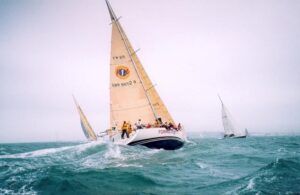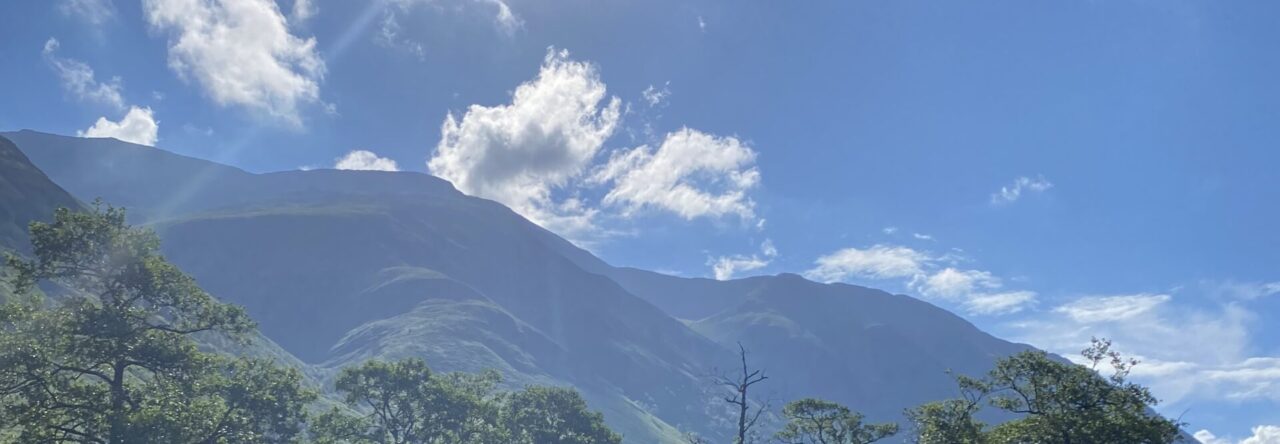It’s well known that land has a smell, which we no longer notice on a daily basis. However, upon recently watching ‘Maiden’ (2018, see trailer here), I was inspired to consider the experience of smelling land for the first time, particularly for returning sailors after long periods at sea. This is a unique experience which few will have the opportunity to experience, but one which highlights the lack of recognition we give for smells through the process of becoming ‘noseblind’.
Sailors on long journeys are used to experiencing pungent smells when living in close proximity with others for extended periods. The smells of damp clothes, unwashed bodies, cooking, salt, and vomit – to name just a few. Speaking to family members who have done long distance yacht racing (figure 1), the smells on the boat have stuck with them and they can vividly remember these odours whilst reminiscing their sailing experiences.

Figure 1. A yacht taking part in a long-distance race approaching the shore, where sailors were re-united with the smell of the land. (Author’s own image, 2021)
However, whilst sailors experience a cacophony of smells within the small confines of their boats, it is not until they return to land that they are re-united with the smells found on land, and the smell of land itself, that we are all usually so accustomed to. In the documentary about the ‘Maiden’ boat in the Whitbread Round the World race, Mundy (Maiden 2018, 56:26) speaks about the experience of arriving in Australia: “Land smells. And you can smell it days and days out, particularly Australia, all the eucalyptus and this deep hot earth smell”. Chisholm (2015) also discusses how sailors can smell the pollution of the ocean as they near certain parts of the world, such as coastal pollution off the coast of Rio de Janeiro, where they could smell and then see changes in the water quality. Multiple other blogs by sailors also highlight this experience, stating that “as you approach an island, you will usually experience a sudden pungent smell. The vegetation and odors of fish near the shore can be quite strong” (Taylor 2011, np).
These accounts highlight the experience of not realising what you can’t smell, until you can smell it again – or as Febreze have sloganized it: going ‘noseblind’ (Febreze.com, n.d.).
Febreze has capitalised on the concept of going ‘noseblind’ to our own localised smells in order to market their air freshener products (Procter and Gamble 2016):
https://www.youtube.com/watch?v=tdB0yCGeToE
Similarly to how we become accustomed to the smell of land until we smell it for the first time again, the same thing happens on a smaller scale, where we can get used to the (sometimes unpleasant) smells found within our homes. In a marketing strategy to play on the fear most have of having a bad smelling home, Febreze claim that their products get rid of any bad odours that we may have gone ‘noseblind’ to. In turn, going ‘noseblind’ has become a more widely used term within society and there is a greater awareness of this process where we sub-consciously lose the ability to smell certain things.
Word count: 499
Bibliography
Chisholm, J. (2015) ‘“Fifty miles out we could smell the pollution”: sailing amid the ocean litter’. The Guardian [online]. Available at: <https://www.theguardian.com/environment/2015/jan/25/sailing-amid-the-ocean-litter> [Accessed 24 March 2022]
Febreze.com. (n.d.) Noseblind Videos & Tips | Febreze. [Online] Available at: <https://www.febreze.com/en-us/learn/noseblind> [Accessed 24 March 2022]
Hollywoodstreams (2019) ‘Maiden’ Documentary Trailer. [Online] Available at: <https://youtu.be/HxhEInUzqlE> [Accessed 28 March 2022]
Maiden (2018) Directed by Holmes, A. [Film]. New Black Films.
Procter and Gamble (2016) ‘Are you #Noseblind? Try Febreze Fabric Refresher | P&G UK and Ireland’ [Video] Available at: <https://www.youtube.com/watch?v=tdB0yCGeToE> [Accessed 24 March 2022]
Taylor, F. (2011) ‘Signs of arrival’ Tahina Expedition [Blog], Available at: <https://www.tahinaexpedition.com/2011/05/signs-of-arrival.html> [Accessed 24 March 2022]



Leave a Reply